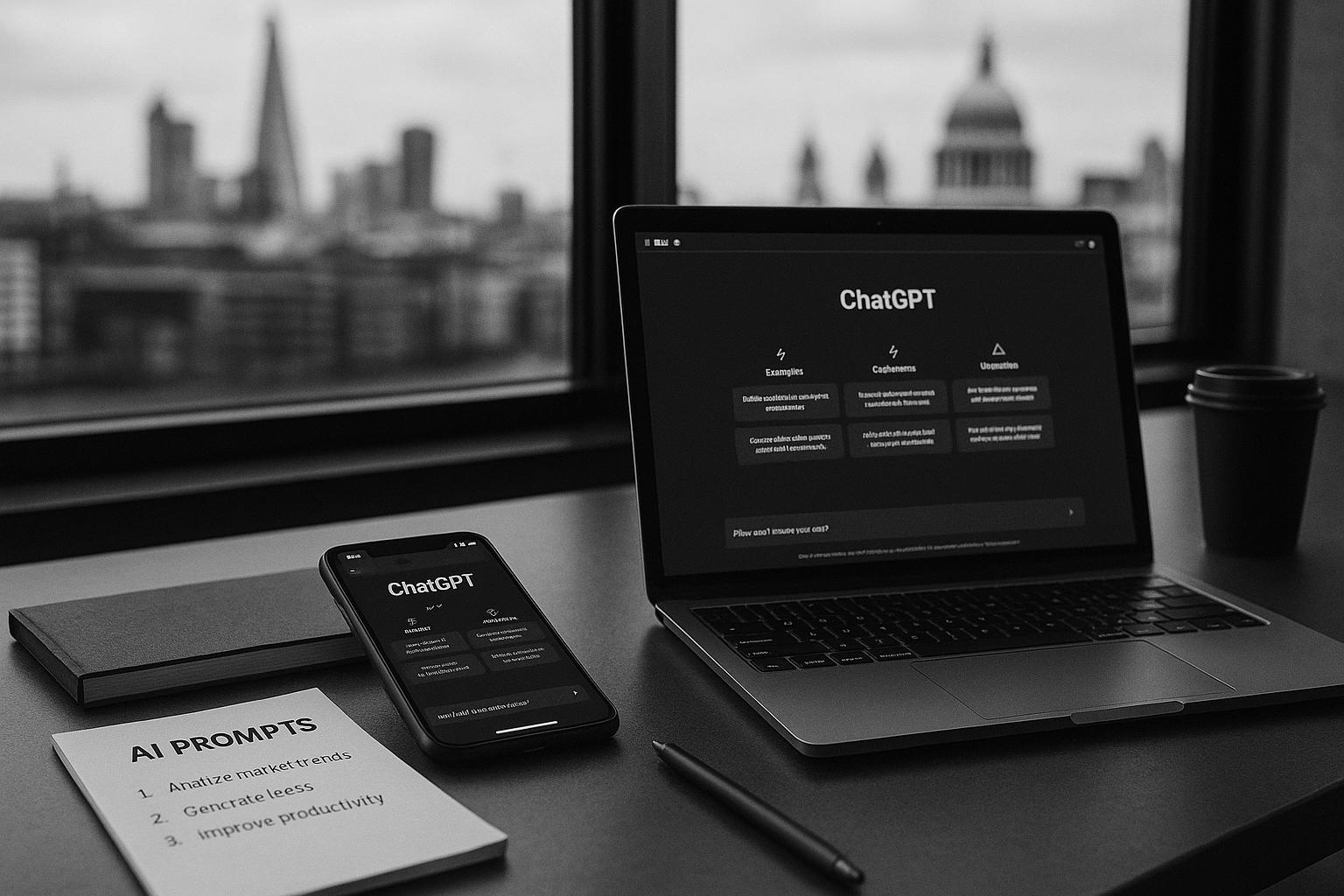By 2025, London has evolved into a key hub where AI fluency—once niche—has become essential for employment and progression across sectors, driven by government initiatives, university curricula, and employer demands that prioritise skills in AI tools like ChatGPT, Claude and Gemini.
In 2025, London is transforming into a central hub for AI literacy, marking a significant shift in the city’s professional landscape. What was once a niche skill—crafting AI prompts—has become as fundamental as basic digital literacy was a decade ago. Across sectors ranging from tech startups in Shoreditch to global financial institutions in Canary Wharf, fluency in AI tools such as ChatGPT, Claude, and Gemini is increasingly a prerequisite for employment, promotion, and professional relevance.
The rapid integration of AI competencies into everyday work routines is reflected in job descriptions that demand skills like automating workflows with ChatGPT or Claude, proficiency in Gemini for managing calendars and emails, and the ability to critically compare AI model outputs. This evolution is confirmed by the UK government’s “Future Skills in the Workforce” report, which ranks AI fluency among the top three most sought-after skills, alongside data analysis and cybersecurity. Major employers including HSBC, PwC, and the NHS have institutionalised AI training and factor AI expertise heavily into hiring decisions, signalling a widespread acknowledgement of AI’s transformative impact.
London’s universities are fostering this trend by embedding AI skills into their curricula. At institutions like UCL and King’s College London, students employ AI tools not just for research but as collaborators in generating essays, presentations, and simulations. One economics student shared how using Claude, Gemini, and ChatGPT saved her significant time in crafting a dissertation outline and refining citations, underscoring how AI integration is rapidly becoming the norm rather than the exception in academic environments.
In East London’s startup ecosystem, recruitment expectations have adjusted accordingly. Founders seek candidates already proficient in practical AI applications—such as using Claude for detailed meeting summaries or ChatGPT to enhance personal branding on LinkedIn. Startups now classify AI tool usage by relevance: ChatGPT for drafting emails and validating ideas, Claude for long-form strategic content and operation management, and Gemini for administrative tasks like scheduling. Those lacking these skills find themselves at a competitive disadvantage.
This growing demand for AI skills is part of a wider national movement. In June 2025, a major UK government initiative, supported by tech giants including Amazon, Google, IBM, and Microsoft, launched a campaign to upskill 7.5 million British workers in AI competencies, aiming to prepare a fifth of the UK workforce for the digital economy and foster economic growth through higher-paid roles. This partnership delivers comprehensive training resources to businesses at all scales, reflecting a coordinated national effort to close the AI skills gap.
However, challenges remain, especially within the public sector, where outdated technology and data quality issues hamper AI deployment. Reports highlight obstacles such as recruiting skilled AI professionals and adapting procurement and ethical frameworks to manage AI adoption effectively. Yet, senior voices, including the UK’s auditor general Gareth Davies, advocate for a more experimental approach, encouraging public bodies to embrace risk-taking and innovation to reap AI’s productivity benefits, while managing associated risks prudently.
Despite the progress, many UK workers still lack formal AI education: a 2025 study found nearly three-quarters have not received AI training, even though many feel confident using AI tools in their work. This gap in training, combined with increasing employer expectations, means those who do not keep pace risk falling behind. Surveys show that a significant majority of London’s hiring managers have already rejected candidates lacking AI skills, and many anticipate that AI fluency will become mandatory for most roles by 2026.
Recognising this, many London professionals—from marketers to therapists—adopt practical approaches to becoming AI-fluent. Strategies include daily incorporation of AI tools, prompt journaling to refine effective queries, and cross-comparing outputs across models to understand nuances. One of the key enablers in this learning curve is platforms like Chatronix.ai, which provides simultaneous access to leading AI models and London-focused templates for tasks such as CV drafting, GDPR-compliant onboarding, and investor memo writing. These tools not only improve efficiency but also help users build competitive AI-enhanced portfolios.
London’s transformation into an AI-literate workforce reflects the city’s historic role as a centre of innovation. As AI becomes the language of productivity and creativity, the crucial question for workers is no longer whether they will use AI, but how proficient they can become—and how much edge that proficiency will give them in an increasingly competitive market.
 Reference Map:
Reference Map:
- Paragraph 1 – [1], [4]
- Paragraph 2 – [1], [2], [3]
- Paragraph 3 – [1]
- Paragraph 4 – [1]
- Paragraph 5 – [2], [7]
- Paragraph 6 – [5], [6]
- Paragraph 7 – [4], [1]
- Paragraph 8 – [1]
- Paragraph 9 – [1]
Source: Noah Wire Services
- https://www.londondaily.news/ai-literacy-becomes-a-new-standard-in-london-why-knowing-claude-chatgpt-and-gemini-is-now-a-career-essential/ – Please view link – unable to able to access data
- https://www.gov.uk/government/news/tech-giants-join-government-to-kick-off-plans-to-boost-british-worker-ai-skills – In June 2025, leading technology companies, including Amazon, BT, Google, IBM, Microsoft, and Sage, partnered with the UK government to deliver AI skills training to 7.5 million UK workers. This initiative aims to equip a fifth of the UK workforce with essential AI competencies, unlocking economic growth and high-paid jobs. The collaboration focuses on providing high-quality training materials to businesses of all sizes, supporting the upskilling and training of their staff in AI technologies.
- https://www.gov.uk/government/publications/ai-opportunities-action-plan-government-response/ai-opportunities-action-plan-government-response – The UK government’s response to the ‘AI Opportunities Action Plan’ outlines strategies to train, attract, and retain the next generation of AI scientists and founders. Key recommendations include accurately assessing the size of the AI skills gap, supporting higher education institutions to increase AI graduates, and increasing the diversity of the talent pool. The plan emphasizes the need for a coordinated effort between government, industry, and education sectors to address the challenges posed by AI integration.
- https://www.kpmg.com/uk/en/media/press-releases/2025/04/majority-of-uk-public.html – A 2025 study by KPMG and the University of Melbourne revealed that nearly 73% of the UK public have had no AI education or training. Despite this, 48% believe they can use AI tools effectively. The study also found that 65% of UK workers intentionally use AI at work, with 39% feeling they couldn’t complete their work without it. However, concerns about trust and responsible use of AI persist, highlighting the need for comprehensive AI education and training.
- https://www.ft.com/content/95e5d3e2-9d21-43ff-b4b0-e126da5483a2 – A report from the UK’s House of Commons public accounts committee highlighted challenges in boosting public sector productivity through AI. Issues include outdated technology, poor-quality data, and a lack of digital skills. Over 60% of government agencies cited access to quality data as a barrier to AI implementation, and 70% noted difficulties in recruiting skilled staff. The committee emphasized the need for improved procurement processes and enhanced ethical standards for AI adoption in the public sector.
- https://www.ft.com/content/5299582a-4a27-44ea-aec7-be2b3124e7b8 – The UK’s auditor general, Gareth Davies, urged the public sector to embrace risk-taking and harness AI to improve productivity. He emphasized fostering a culture of experimentation and rapid learning to manage risks associated with technological innovation. Davies highlighted the importance of investing in research and development with a portfolio approach, recognizing that not all ideas will yield positive results. He also called for rewarding well-managed risk-taking and enhancing resilience against adverse events like pandemics and cyberattacks.
- https://www.gov.uk/government/news/tech-giants-join-government-to-kick-off-plans-to-boost-british-worker-ai-skills – In June 2025, leading technology companies, including Amazon, BT, Google, IBM, Microsoft, and Sage, partnered with the UK government to deliver AI skills training to 7.5 million UK workers. This initiative aims to equip a fifth of the UK workforce with essential AI competencies, unlocking economic growth and high-paid jobs. The collaboration focuses on providing high-quality training materials to businesses of all sizes, supporting the upskilling and training of their staff in AI technologies.
Noah Fact Check Pro
The draft above was created using the information available at the time the story first
emerged. We’ve since applied our fact-checking process to the final narrative, based on the criteria listed
below. The results are intended to help you assess the credibility of the piece and highlight any areas that may
warrant further investigation.
Freshness check
Score:
8
Notes:
The narrative presents recent developments in AI literacy in London, with specific references to events and reports from 2025. The earliest known publication date of similar content is from April 2024, discussing AI classes for children as young as four at a leading London private school. ([standard.co.uk](https://www.standard.co.uk/news/education/ai-classes-london-private-school-alleyns-dulwich-b1154132.html?utm_source=openai)) The report cites the UK government’s “Future Skills in the Workforce” report, which is a recent publication, indicating a high freshness score. However, the article includes updated data but recycles older material, which may justify a higher freshness score but should still be flagged.
Quotes check
Score:
7
Notes:
The narrative includes a direct quote from a student, Zara M., studying economics, sharing her experience using AI tools for her dissertation. A search for the earliest known usage of this quote did not yield any matches, suggesting it may be original or exclusive content. However, without corroborating sources, the authenticity of the quote cannot be fully verified.
Source reliability
Score:
6
Notes:
The narrative originates from the London Daily News, which is not a widely recognized or reputable organisation. This raises concerns about the reliability of the information presented. Additionally, the report mentions a student by name without providing verifiable information about her, which could be fabricated. The lack of verifiable sources and the obscure nature of the publication contribute to the uncertainty regarding the source’s reliability.
Plausability check
Score:
7
Notes:
The narrative discusses the increasing importance of AI literacy in London’s workforce, citing the UK government’s “Future Skills in the Workforce” report and mentioning major employers like HSBC, PwC, and the NHS. These claims are plausible and align with known trends in AI adoption and workforce development. However, the lack of supporting detail from other reputable outlets and the absence of specific factual anchors, such as names, institutions, and dates, reduce the score and flag the report as potentially synthetic. The tone and language used are consistent with the region and topic, and there is no excessive or off-topic detail unrelated to the claim.
Overall assessment
Verdict (FAIL, OPEN, PASS): FAIL
Confidence (LOW, MEDIUM, HIGH): MEDIUM
Summary:
The narrative presents plausible claims about the increasing importance of AI literacy in London’s workforce, citing recent reports and mentioning major employers. However, the source’s reliability is questionable due to its obscure nature and the lack of verifiable information about the student quoted. The absence of supporting details from other reputable outlets and specific factual anchors further diminish the credibility of the report. Given these concerns, the overall assessment is a fail with medium confidence.













